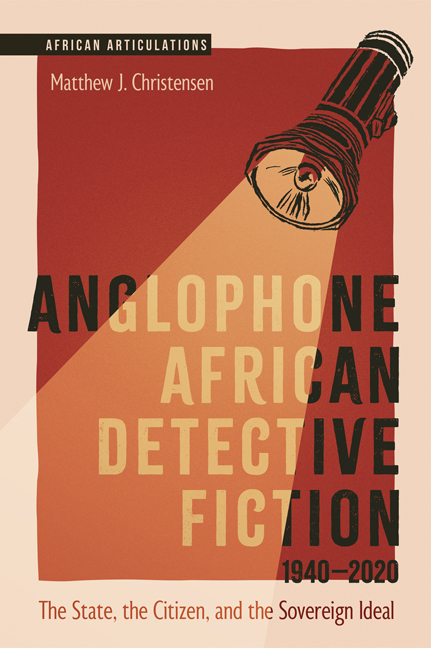Book contents
- Frontmatter
- Dedication
- Contents
- List of Illustrations
- Acknowledgements
- Introduction
- Part 1 Africanizing Detective Fiction’s Un/Sovereign Subjects
- Part 2 Neoliberal Noir
- Conclusion: The Future Imperfect
- An Anglophone African Detective Fiction Bibliography, 1940–2023
- Bibliography
- Index
- Miscellaneous Endmatter
1 - Dispossession, Rescue, and the Sovereign Self in the Colonial-Era Detective Story
Published online by Cambridge University Press: 11 May 2024
- Frontmatter
- Dedication
- Contents
- List of Illustrations
- Acknowledgements
- Introduction
- Part 1 Africanizing Detective Fiction’s Un/Sovereign Subjects
- Part 2 Neoliberal Noir
- Conclusion: The Future Imperfect
- An Anglophone African Detective Fiction Bibliography, 1940–2023
- Bibliography
- Index
- Miscellaneous Endmatter
Summary
Anglophone Africa's first detective stories arrived in a world primed to receive them. Readers and cinema-goers from Lagos to Sophiatown were already avid consumers of locked-room whodunits and Hollywood gangster films. Perhaps more importantly, the anxieties about individual autonomy, competitive social relations, urban complexity, and the availability of state-backed protections that give detective fiction its emotional weight and cultural currency were felt acutely in the fast-growing colonial cities where most potential readers resided. The urban social atomization that freed individuals from the traditional strictures of village sociability often left individuals isolated and anonymous, and vulnerable to predation. The privations of the colonial economy could force otherwise law-abiding people into the various forms of criminality required for basic economic survival. Above all, the colonial state could, and did, exert its repressive powers into even the most private spaces the city, serving as a continual reminder that the state's purpose was not to ensure the rights and security of its African population but to dispossess Africans of them. For all the city's economic opportunities, radical individual freedoms, and illicit pleasures, few places could be considered safe, few strangers or friends fully trustworthy, and no agent of the law a reassuring presence. The colonial city remained the locus of persistent menace, of perpetual risk and vulnerability, and danger of physical, social, and psychic obliteration.
With an appreciation for the detective story's unique ability to dramatize anxieties such as these, Ghana's R.E. Obeng and Nigeria's Cyprian Ekwensi wrote their first detective stories in the 1940s, and South Africa's Arthur Maimane and Mbokotwane Manqupu published theirs, in Drum magazine, in the 1950s. Little information remains about the style, content, or themes of Obeng's now-lost detective story collection Issa Busanga. The same cannot be said for Maimane's Chief series (1953), Manqupu's ‘Love Comes Deadly’ (1955), or Ekwensi's short stories (1947, 1948, 1951) and novel People of the City (1954). For their African readers, Maimane, Manqupu, and Ekwensi craft distinctly African mysteries that play on the fantasies and fears of modern urban life.
- Type
- Chapter
- Information
- Anglophone African Detective Fiction 1940-2020The State, the Citizen, and the Sovereign Ideal, pp. 29 - 58Publisher: Boydell & BrewerPrint publication year: 2024



